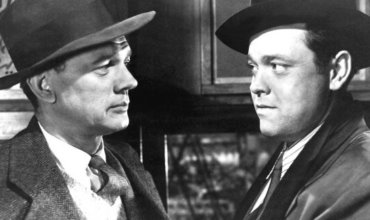What if Tony Soprano had to abruptly retire from his career in ‘waste management’ and pick up an entry-level job working for a tech conglomerate whose products he can barely use? Throw in the anti-establishment comradery of Office Space and the lowkey sci-fi world building of Primer and you get Lapsis, the genre feature written, directed, edited and scored by Noah Hutton. Dean Imperial stars as unofficial Tony S impersonator Ray Tincelli, taking up cabling to financially support his kid brother Jamie who suffers from omnia (a type of chronic fatigue syndrome.) The premise is wholly original, and the result is an immensely interesting and enjoyable film that validated my verbal abuse towards my Google Nest Mini.
Ray is a little out of step with the rest of the world. Quantum computers are the norm and he has a regular old ‘standard’ computer. He gets parking tickets because he doesn’t have access to the ‘correct’ calendar. He still has a landline (bless him.) He loses his opportunity for promotion when his boss receives a visit from the FBI, so he is forced to accept a job laying cable out in the wilderness for CBLR – a Quantum affiliate that hires average Joes to walk through the woods outside New York and plug cable into big, imposing cubes to support Quantum’s servers. Like a stay-at-home mum roped into selling essential oils or overpriced dildos to her nearest and dearest, Ray gets caught up in the game (and discovers some unfortunate truths about working at the bottom of the pyramid.)
Upon induction for CBLR Ray is told to “challenge your status quo” by annoyingly child-like machine voices who know not the pains of walking through the woods as an arguably plus-sized man. He is given a medallion (a PDA of some sort) that he must scan at checkpoints in the woods, and he discovers that while everyone else got to pick their name, his medallion is preloaded with a name, points, and other data that come into play later. His moniker is “Lapsis Beeftech”, and while it’s fitting for his glorious bod, saying this name to anyone results in some looks. Allies tell him to make up a different name to tell others. Foes get aggressive and jealous. It’s a lot to deal with on his first day.
Working for CBLR seems eerily similar to working any minimum wage retail job. You rest when you’re told, you’re pitted against your colleagues to earn commission and ultimately, you’re expendable. Ray finds out the hard way that automated carts, as a motivational strategy, sometimes get onto human workers’ routes and steal them (and in turn the cash for that particular job). But trying to stop the carts can end in human workers being picked up and ‘removed’ by Corporate for tampering with company property. The only way to ensure you don’t lose your job to a bot is to employ a polyphasic sleeping schedule (similar to the one Kramer trials and fails in Seinfeld) so that they don’t pass you in the night.
Another tactic however, taught to Ray by veteran cabler and mentor Anna (Madeline Wise), is to trap the cart in a makeshift Stonehenge while wearing gloves so that DNA can’t be traced to the tampering. The lengths these people have to go to for wage security are hilarious (and sad), and workers comp claims are another story altogether. A plot involving a revolt from other grassroots cablers for a “fair go” weaves its way through the rest of the story and crescendos in an excellent montage of misbehaviour that I won’t spoil.
The most impressive thing about Lapsis is its dedication to its quirky world. Comedy and mystery are interwoven brilliantly as info-dumps of dialogue are delivered with totally straight faces, and every single character seems like someone you’ve met at work once. The music is ingenious – my favourite scene involves a revelation that the seemingly non-diegetic saxophone jam we’ve been hearing is actually coming from some guy out in the woods on an ‘approved rest’, who then has to stop mid-song when his medallion says it’s time to get back to work. The sci-fi elements all look like they could exist in the real world, including the automated carts, whose stupid, clunky walking and comical appearance contrast with their very real ability to ruin everything for the human characters.
Dean Imperial is endearing as hell as Ray (and it’s not just because of his Gandolfini-esque physique that I find attractive.) He’s the everyman we can all relate to – not in the best shape, not quite where he should be in his life for his age, hair-thinning and vision-waning, and frustrated with his phone. Madeline Wise’s Anna is the Cool Girl we aspire to be, and she and Ray’s chemistry peaks in a really lovely scene where their routes diverge and they try to continue a very important conversation which gets muffled and lost the further apart they get. It’s an oddly sweet moment amongst the intrigue, and very relatable for anyone who’s worked an insufferable job before and been put on opposite shifts to your friend because you talk too much and don’t serve customers (definitely not me.)
I was lucky enough to see Lapsis on a Saturday morning at Luna and what stuck out to me while attending the screening was the demographic. The average age was 65, and my husband and I felt a little out of place. I’ve been known to shit on boomers in the past – I once bullied Mark Naglazas via meme when he rightly pointed out (on one of my snarkier Facebook posts) that they are a massive support in keeping cinemas open here in Perth. But after this experience I’ve realised that there’s merit to giving old things a chance. Funnily enough, this film has the same message.
Lapsis is not perfect – the story does go off track towards the end and finishes with a bit of a whimper. But it’s a smashing effort from a director so clearly passionate about big ideas (as evidenced by his documentaries and shorts) and willing to wear so many hats to ensure his vision gets realised. I hope his dedication gets rewarded by bums in seats and phones on silent.
I give Lapsis 8/10. Apparently it opens June 3rd but you might wanna check that from an approved computer.


